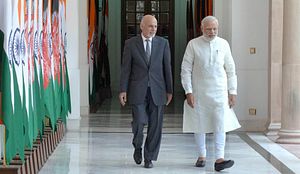On August 15, 2016, the backyard of the Indian embassy in Kabul filled with Afghans of every walk and every ethno-sectarian background for a reception to celebrate the 70th anniversary of India’s independence. Afghan guests lined up from the embassy’s entrance door to the area where the ambassador of India to Afghanistan, Manpreet Vohra, and his colleagues were welcoming guests. Afghans extended to the ambassador, the Indian people, and the Indian residents in Afghanistan their heartfelt congratulations on India’s independence and wished Indians welfare and prosperity, in peaceful coexistence with their neighbors.
As their shared history records, Afghans had been one of the staunchest supporters of India’s long-standing struggle for self-determination and independence. The story of Kabuli-wala in the timeless work of Tagore best captures the affection Afghans have for Indians, as well as their loyalty to those that they trust and befriend. That is why Afghans share the delight and pride of Indians in celebrating the great day in their rich history, which is interwoven with that of Afghanistan in countless ways.
Following her independence, India has made notable progress in every sphere of her polity, society, and economy. As a time-tested friend and neighbor, Afghans proudly celebrate India’s continued successes as a fast developing country and a growing power on the global stage. In light of their shared vital interests, ties between Afghanistan and India will further expand and deepen in the years and decades to come. This is already manifesting in India’s generous assistance for the stabilization and sustainable development of Afghanistan over the past 15 years.
In the recent years, the pace of Indo-Afghan bilateral cooperation in the political, security, development, and cultural areas has continued to accelerate, on the basis of the Afghanistan-India strategic partnership agreement (SPA). Afghans and their government immensely appreciate the multifaceted aid programs of India, which have been designed and delivered effectively, in response to and at the request of the Afghan government. So far, India’s aid in the form of small development projects has reached every corner of Afghanistan, helping lift out of poverty many Afghan families at the district and village levels.
In the current year, Indo-Afghan partnership has seen a number of key infrastructure projects financed and implemented by India: The construction and opening of Afghanistan’s parliament building and the Afghanistan-India friendship dam (Salma Dam) stand out. So does India’s timely provision of a few helicopters, which has contributed to an enabling environment for stabilization, and development of Afghanistan.
The outcomes Afghanistan and India mutually seek from their results-oriented partnership aim at achieving regional economic integration and sustainable security, whereby every nation around them thrives in peace and stability. In the recent months, a number of joint working groups under the SPA framework—covering infrastructure, human resource development, and cultural cooperation—have met. In the same vein, the Afghan ministry of foreign affairs looks forward to holding in Kabul the second meeting of the Afghanistan-India council for partnership.
Indeed, ensuring regional security and prosperity is one of the key objectives of Afghanistan’s foreign policy. And it also constitutes the key commonality, which underpins Afghanistan’s strategic partnership with India. This timeless humanitarian motive is the driving force behind the two countries’ hard efforts to stabilize Afghanistan as the main gateway to the ancient and now-emerging Silk Roads.
Terrorism, which undermines Indo-Afghan efforts for a secure and prosperous region, also gives impetus to their robust partnership. Both countries are collaborating with the rest of the international community to fight and uproot the threats of terrorism and radicalism in South Asia, a region of vast human and natural resources, which should be harnessed for its sustainable development.
Like Afghanistan and India, China and Russia have also been targets of terrorist attacks, and remain concerned about the growing threats of terrorism, radicalism, and criminality that primarily destabilize Afghanistan, but also undermine regional peace and stability. Afghanistan has of course long been fighting the threat of terrorism. Its forces continue to wage a relentless campaign that has found consistent institutional support outside of Afghanistan.
As Afghan President Ashraf Ghani often says, Afghanistan occupies “a prominent place in the narrative and activities of terrorist organization networks; they are betting on our failure and should we fail, three of our neighbors, China, India, and Russia, out of the big countries, will be in harm’s way, but also all our other neighbors, near and far.”
To avoid this scenario, especially in light of the rising presence of ISIS in Afghanistan, Ghani has repeatedly called on the three key regional players to join in a “forceful and coherent action” against any threats that undermine the security and stability of the region. He has strongly recommended that such mechanisms of regional cooperation as the Shanghai Cooperation Organization (SCO) – which now includes India and Pakistan – adopt a comprehensive strategy to overcome terrorism, since international actions have so far been “partial and fragmented,” while terrorist networks such as ISIS and Al Qaeda have moved “with coherence, determination, and decisiveness.”
A Visiting Fellow at the Observer Research Foundation (ORF), M. Ashraf Haidari is the Director-General of Policy & Strategy of the Ministry of Foreign Affairs of Afghanistan, and formerly served as the country’s Deputy Chief of Mission to India. Prior to this, he was Afghanistan’s Deputy Assistant National Security Advisor, as well as Afghan Chargé d’Affaires to the United States. He tweets @MAshrafHaidari

































